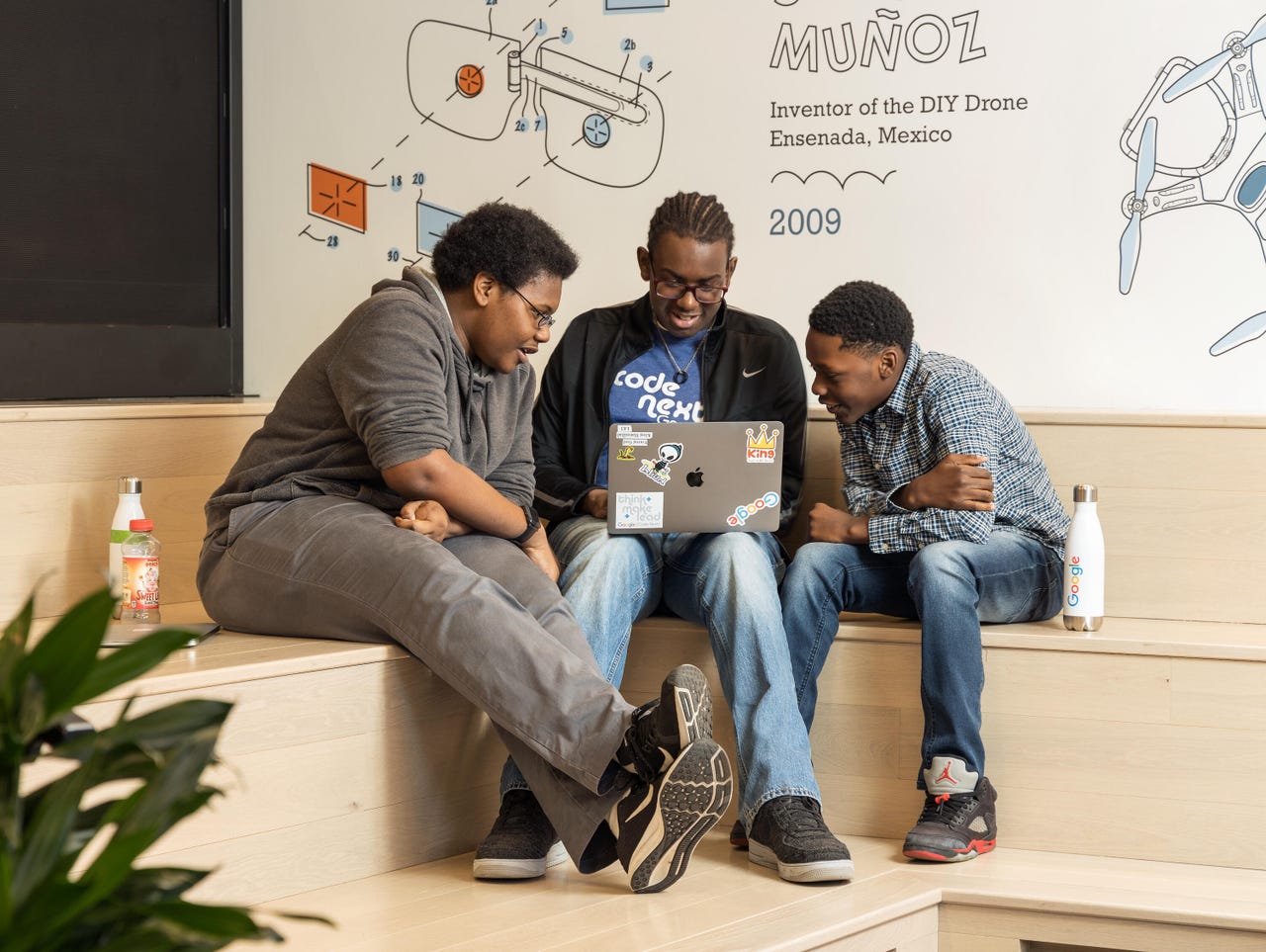
































Students at Google's Code Next lab in New York City work on a partner-coding exercise in Javascript.
GoogleImproving diversity, equity and inclusion in tech is top of mind for educators across the globe. And yet, when students of color in tech look around, they often realize that not many of their peers or teachers look like them.
The same is true when Black, Hispanic and Indigenous students enter the workforce. And the number of people of color in tech is often out of alignment with the demographics of local communities.
Work to address these issues continues. But progress in increasing diversity in STEM jobs remains "uneven," according to a 2021 report.
Not only are [students] going to walk into this lab and feel like they are owners in their future and owners in the future of Google, but we're hoping because of what that building represents for the city that they feel like they are indeed owners in the future direction of the city at large, and that's really special for us. Kyle Ali, Code NextSeveral years ago, Google employees of color came together to talk about ways to address this ongoing challenge. Their collaborative conversations gave life to the Code Next program in 2015, according to Kyle Ali.
Ali is Google's interim senior lead program manager for Code Next. He spoke with ZDNet about its launch.
In the Code Next program, Google engages 9th through 12th graders in live coding labs where students "have access to live coaches, world-class technology and learning experiences that would both shape and mold their confidence," Ali said.
"[We] also help them build the skill set and a network that can enable them to step into some of the most rigorous computer science programs and to step back into their own communities and to become makers and to become the builders and shape the future of technology."
READ THIS: Diversity in tech: What it means and how to get there
Code Next currently has labs in New York City and Oakland. Ali said the program has evolved. When the pandemic hit, Google launched Code Next Connect. This online version of the program currently has students from 42 states.
Ali explained to ZDNet why they chose Detroit as the next place to grow Google's in-person presence.
"We've got our lab in Oakland, we've got our lab in New York City, so we've got the coasts covered," Ali said. "But the Midwest has always been on our radar, and Detroit just proved to be such a unique opportunity."
Earlier this year, Ruth Porat, senior vice president and chief financial officer of Google and parent company Alphabet, announced that the company would join Ford Motor Co. as a founding member of the Michigan Central redevelopment project.
Ford wants to transform the 30-acre urban site into a "walkable innovation hub" that will feature "new and revitalized buildings, a first of its kind mobility testing platform, multiple outdoor plazas, open spaces, and 1.2 million square feet of commercial public space."
According to news reports, Ford plans to invest$740 million in the project. The state of Michigan also "plans to align more than$126 million in new and existing investments, programming and resources" to support the project.
"And the opportunity to be a part of that project was really exciting to us," Ali said. "To bring our content into a place that has a rich cultural history, and bring our content to a place that has a rich industrial history, to be there now as it begins to have an impact on the future of technology felt really exciting.
"When we think about our labs," he continued, "what's really, really important to us is our students feel like they have a sense of ownership in our labs. When they walk into our space, we want them to feel like it is indeed their space.
"Particularly in Detroit, this is an amazing opportunity," Ali added. "Because not only are they going to walk into this lab and feel like they are owners in their future and owners in the future of Google, but we're hoping because of what that building represents for the city that they feel like they are indeed owners in the future direction of the city at large, and that's really special for us."
Code Next labs include spaces designed by Kurani architects for students to spend time with one another and interact with Google coaches, as well as wall designs celebrating local engineers and inventors of color.
GoogleMary Jo Madda, senior program manager, growth and engagement at Code Next, said going virtual allowed them to engage with students everywhere, including in Detroit. Their enthusiasm and engagement caught Google's attention.
"It's the first time that we've opened up in a city where we have some existing alumni who are then going to be able to come into the lab and do work with the students and sort of help with that long-term pathway development," Madda said.
"Because as much as we can provide some amazing things for the students, there's really nothing quite like having a student like Joshua Wallington, who's a freshman at Howard University, come home to Detroit over the summer and work with the kids in the physical Detroit lab.
 Etiquetas calientes:
Etiquetas calientes: